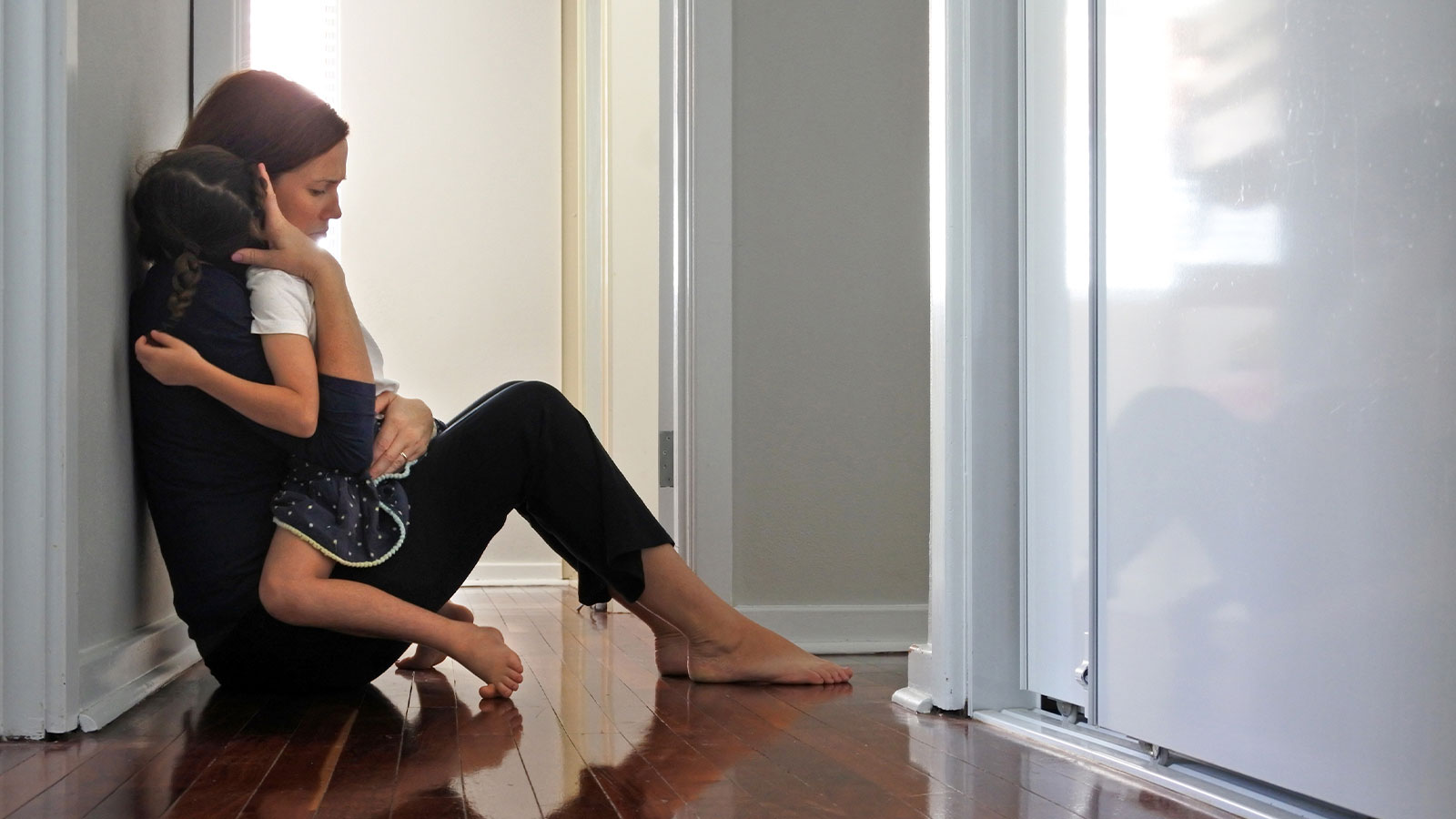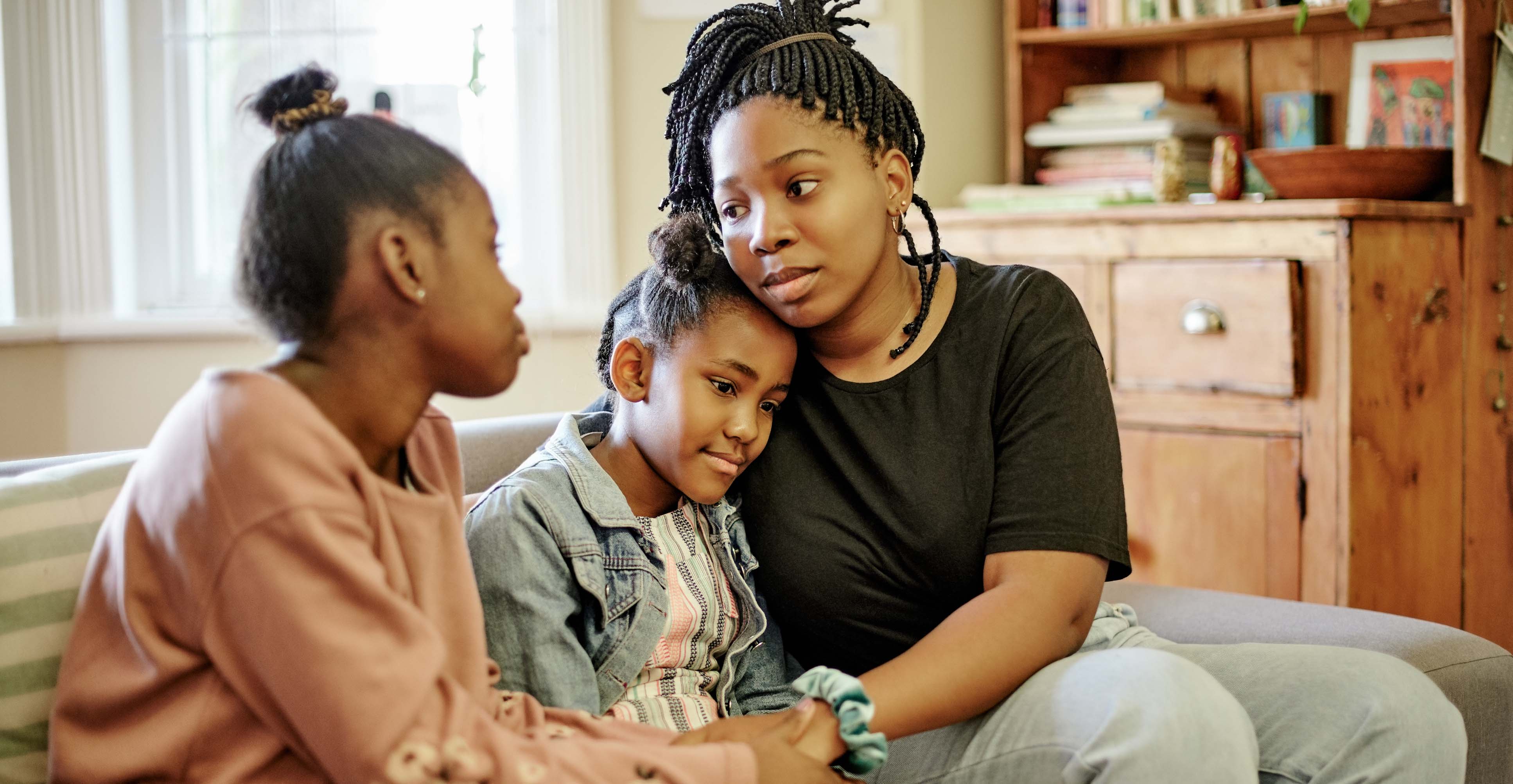Parenting Alone: Managing Grief While Raising Children

If you’ve ever flown, you’ve heard the instruction to secure your own oxygen mask before assisting others. This guidance is often used as an illustration to emphasize that we cannot help others effectively until we’ve first taken care of ourselves.
But when it comes to helping grieving children, this analogy may not entirely work. Yes, on the plane you need to put on your oxygen mask first. But that takes only a few seconds. Grieving the death of a spouse is far more extensive. Perhaps it is better to say that managing grief while raising children is a bit like trying to build a bridge that you’re already crossing. You’re navigating your own grief while also addressing your children’s grief, and every step feels unsteady.
You didn’t ask to be parenting alone, but that is your present reality. Here are a few tips for helping you build the bridge toward healing. Though it may not feel like it now, substantial healing is possible. Just ask Clarissa, who unexpectedly became a single mother. She is a few years into her journey now and says this:
I’ve come to see grief as a kind of companion that will now walk with me through my life. An uneasy, unwelcome companion, perhaps, but one that gives me wisdom. It is a companion that helps me see my children grow and be so grateful because I now see how fragile life can be. There is wisdom that has been gained through grief. I notice things I didn’t notice before. It connects me with the love that I still have for my husband and gives me wisdom to live a really good life now. Clarissa
The wisdom and perspective we gain from grief do not mitigate the present difficulties that we face. There are many challenges of grieving while parenting.
The challenges of grieving while parenting
There is a pot on the stove in the kitchen, two kids fighting over a toy on the living room floor, and another child putting some foreign object in her mouth. You rush to keep your youngest from danger, attempt to make peace between the other two siblings, and meanwhile your pot is boiling over. You hear it bubbling and the water sizzle as it crashes to the hot surface. As you go to tend to your supper, you see that your youngest has found another source of danger. The boiling pot will have to wait another moment. Your grief is like that pot on the stove. You know it needs to be dealt with, but other pressing needs keep drawing you away. You still feel the loss, but you also feel like there’s no time to grieve. This was Deb’s experience:
I don’t even think I had time to grieve for my husband. All of a sudden I was in charge of everything and I had no idea what I was doing. I had three kids and they were going in a hundred different directions. They were grieving. And we still had a whole family to run. I didn’t feel like I had time to grieve. Deb
Deb was able to turn down the heat on her “boiling pot” for a season to tend to parental responsibilities. But the grief kept simmering. Eventually she “started to feel that deep, desperate darkness of grief.” When she finally felt like they were getting into a routine, “then it all hit,” she says. When her sobbing children came to her with questions she couldn’t answer, she realized she couldn’t make it better. “I had no words. Watching my kids grieve their father, because I couldn’t make it better and fix it, was the hardest thing I’ve ever done in my life. And I just had to sit with them in it.”
 The honest questions and raw emotion of children often touch places in our soul that are still very tender. In this vulnerability our loss is often magnified—which can intensify grief. Part of what you are experiencing is called role overload. Parenting alongside a partner is tough enough, but you’re now having to adjust to taking on both parenting roles. This comes with financial, logistical, emotional, and many other difficulties. Bekah shares the depth of loss she felt early in her grief:
The honest questions and raw emotion of children often touch places in our soul that are still very tender. In this vulnerability our loss is often magnified—which can intensify grief. Part of what you are experiencing is called role overload. Parenting alongside a partner is tough enough, but you’re now having to adjust to taking on both parenting roles. This comes with financial, logistical, emotional, and many other difficulties. Bekah shares the depth of loss she felt early in her grief:
I’ve lost a partner. I’ve lost a confidant, I’ve lost the person that would back me up when I made tough parenting calls, and I’ve lost the vision of the family I hoped to build. I felt like I lost all the resources that I wanted for my children. This left me feeling inadequate, because I felt like I couldn’t give them what they needed from both parents. Bekah
This is a daunting task. This is why so many parents throw themselves into supporting their children and avoid looking at their own grief. But if you’re going to help your children as best as you can, you must tend to your own grief. Here are a few self-care tips for a newly single mom or single dad.
4 self-care tips for the surviving parent
There are four areas where you’ll need to focus self-care attention. You’ll need physical, emotional, spiritual, and relational refreshment.
Caring for your physical needs
One of the first things to do is acknowledge your physical limitations. Grief can actually help you to realize your limits in a way that not much else can. In his book You’re Only Human, Kelly Kapic says,
All of us bounce between the illusion that we are in control and the world’s demonstration that we are not. … Whether through tragedy or simply as the result of aging, we all are repeatedly reminded that we are fragile and dependent creatures. … The odd thing is that, even when we run into our inevitable limits, we often hang on to the delusion that if we just work harder, if we simply squeeze tighter, if we become more efficient, we can eventually regain control.
The sooner you acknowledge your limits, the better off you will be. One way to remind yourself of simple physical self-care is the acronym DEER. This helps you remember to check whether or not you are drinking enough water, eating properly, exercising, and resting/sleeping. By taking care of your body in this way, you will be able to give attention to other aspects of your life.
Recognizing your limits means that it’s okay to slow down in this season. It’s important to proceed a little slower than you did before. You’ll need to have realistic expectations and take it one day at a time. Make adjustments slowly. You may be forced to make big and difficult decisions, but as much as possible, try to save major life adjustments for at least a year.
Caring for your emotional needs
You also need to give attention to processing your emotions. When you’re grieving, you go through intense emotional ups and downs. It feels like you’re in a fog of confusion. The loss of your spouse adds more responsibilities to your plate, while at the same time grief can make the simplest task feel overwhelming.
It’s important to listen to your emotions, as they often reveal what is significant to you, either positively or negatively. That is not to say you should blindly follow them in making decisions, but ignoring them does rob you of important information for decision-making. It will be helpful to identify and name the emotions you are experiencing. Let yourself feel them and work through them. What are they telling you?
To help you sift through the fog, you may find it helpful to journal. As counselor H. Norman Wright shares, “One of the most helpful things that I did, or I encouraged other people to do, is to sit down and hand-write out what you’re experiencing.” Writing things out by hand will slow you down and help you write more thoughtfully. This can help you process what you are feeling.
Caring for your spiritual needs
Journaling is helpful not only in processing emotions, it can also be a way of connecting with God. Journal entries can include prayers, which are part of a vital relationship with the Lord. Journaling can also turn into prayers, which can help with spiritual refreshment. As Marion shares:
My journaling started with prayers. I found one of my journals, and I was amazed at how God had answered prayers that I had written. I mean, that was amazing. So when I found that, that kind of reignited my journaling now, just looking back at where He brought me from. So it’s almost a diary of your blessings with God and your experiences with God. Marion
Now, if your view of prayer is serene, mechanical, and marked by polite formality, it may not be that appealing in such a difficult season. But did you know that the Bible gives us another way of praying called lament? Pastor Paul Tautges defines a lament simply as “a crying out to God in a time of sorrow. It’s a painful prayer.” A lament is like the raw and messy cry of the soul. Many of the psalms are written in the form of a lament. God invites you to unburden your soul before Him.
Consider Psalm 13. The psalmist begins by crying out to God,
How long, LORD? Will you forget me forever?
How long will you hide your face from me?
How long must I wrestle with my thoughts
and day after day have sorrow in my heart?
But eventually the psalmist experiences God’s presence and is able to say, “I will sing the LORD’s praise, for he has been good to me” (Psalm 13:6). The psalmist discovered that even though he felt alone and forgotten, God was present with him. This is a reminder that even as you now parent alone, God is with you.
Caring for your relational needs
Not only do you need this spiritual refreshment, but you also need others. Deb, whom we met earlier, was eventually able to rely upon her support system for help with child care and other things. As she said,
I had one friend who did my finances, one who helped with school stuff, and one who got the kids where they needed to be—I wasn’t doing anything by myself. My family and friends picked up the pieces of my life so I could slowly take things back, like managing finances and the kids’ school. People wanted to help us, and I realized that allowing others to help wasn’t just good for me—it was good for them too. Deb
If you’re grieving along with your children, you too could benefit from a supportive community of people. One possibility is a GriefShare group. In a GriefShare group you will hear from experts and fellow grievers. You will receive a participant guide with exercises, helpful tips, and brief articles that will provide suggestions for responding to your loss and considering what the future might hold. And there are additional video resources to help you care for your grieving children. To find a group, go to griefshare.org.


